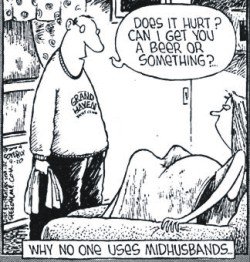“Words are, of course, the most powerful drug used by mankind.” –Rudyard Kipling
Recently, I was asked to teach some lovely nursing students about hypnosis for childbirth. I thought it would be an excellent time to slip in some suggestions for using positive language in the birthing room. Regardless of whether a woman is using hypnosis for her birth, she is still in an altered state of consciousness. Words become suggestions when we are in an altered state. In other words, the power of language grows exponentially during our births.
Based on statements I have heard during births, I put together a hand-out for these nurses. Here is a sampling of what I included.
General Language Suggestions
- “You’re safe” instead of “Don’t be scared, you’re not in danger.” When we are in an altered state of consciousness, our brain takes in only the prominent words in a statement. So “you’re not in danger” becomes simply “Danger.” In movies, I hear people saying, “Don’t die on me!” and think “No! Say, live instead!”
- “Your body is wise.” The birthing mother is the expert on this birth. We must never forget this nor should she.
- “Feel your shoulders relax” instead of “Don’t tense your shoulders.” Again. If we speak in negatives, she might hear “tense your shoulders.”
- For IV placement or injections, “I’m going to rub on some cold and then there might be some pressure” instead of “This will feel like a bee sting.” No one likes a bee sting.
- “Breathe your baby down” instead of “You’ll feel burning.”
- “Special considerations” instead of “complications”
- “You’ve dilated so much!” instead of “You’ve only dilated ½ cm.”
- “When babies are in a posterior position, we can try to…” instead of “Your baby is posterior.” (distance the negatives, only personalize positives)
- “You’ll have all the energy you need to birth your baby” instead of “I’m scared you’re going to wear yourself out.” I hear this one all the time as a reason for women to get an epidural. Women release a surge of adrenaline just before they begin pushing. You’ve heard stories of what incredible feats people accomplish under the influence of adrenaline.
- “You look so strong” instead of “You look like you’re in a lot of pain” or “What is your pain scale?” When a perceived expert tells someone they look like they are in pain, then certainly that is going to influence pain.
Do not say:
- “Get mad at your baby.” I cannot tell you how much this one bothers me. I have strong beliefs that regardless of how babies come into the world (cesarean, forceps, on the side of the freeway), they should be welcomed with joy. Why would you tell someone to get mad at your baby? Or get mad at all? Anger and birth don’t mix in my book.
- “This is going to hurt.” Don’t assume what she will feel. Maybe it will/maybe it won’t. But telling her it will hurt is a guarantee that she will expect pain and likely experience it.
- “You’re not allowed/I can’t let you.”
- “I’m going to be your worst enemy” I’ve actually heard a nurse say, “Think of me as the Wicked Witch.”
Avoid:
- Mentioning numbers (dilation, stats, time) unless she specifically asks. During an unmedicated birth, the thinking brain slows way down. Numbers, questions requiring cognitive answers, consent forms, bright lights may keep the thinking brain engaged.
- Telling her what she’ll feel or trying to describe what you think she’s feeling
- Negatives (Don’t tense your jaw)
- Speaking during pressure waves/contractions
- Unnecessary questions. Questions wake up the thinking brain.
When in doubt:
- Be silent. Or murmur how well she is doing. Be frugal with words.
- Give yourself an affirmation such as “I am entering a sacred space and I will use my words and my skills for healing and comfort. These are the gifts I bring.”
What would you add? What language have you heard in the birthing room that hindered rather than enriched.

